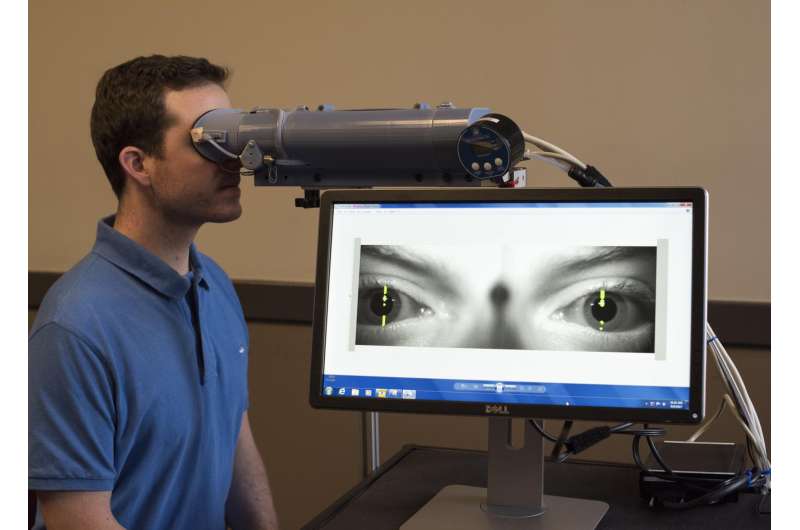Concussion detection aid moves closer to getting in game

A concussion detection aid developed at the Medical University of South Carolina may one day help with field sobriety testing and even detect diseases such as Parkinson's, Huntington's and schizophrenia. All of those conditions can cause changes in the way a person blinks.
But for now, the creators the Blink Reflexometer say the device is simply on track to become an objective, fast and accurate way to test the way an athlete blinks before and after a head injury. The Zucker Institute for Applied Neurosciences at MUSC recently partnered with BLINKtbi, Inc. to test and bring it to market.
BLINKtbi co-founder and Chief Operating Officer Ryan Fiorini, a graduate and former employee of MUSC, said ZIAN made the licensing process much easier than usual for a university-related device. "ZIAN has cracked the code on efficient licensing and being a technical partner for building medical products."
The ZIAN team hopes the Food and Drug Administration will approve the device within two years.
Fiorini said the Blink Reflexometer has the potential to better identify concussions and help the more than 400,000 children and teenagers who suffer a sports-related concussion each year. Some of those kids, like the pro athletes they admire, try to keep playing, even though doing that can cause more serious or even deadly problems. The inventors and care providers working with ZIAN want to change that by offering a concussion detection aid that is fast, portable and can't be cheated.
Changes in a person's blink can indicate a concussion. Co-inventor and ZIAN Chief Executive Officer Mark Semler said because a blink is an involuntary reflex, it's a good way for a trainer trying to make a call on the sidelines to check neurological function.
Nancey Tsai, a physical medicine and rehabilitation doctor, came up the idea while affiliated with MUSC's Neuroscience Department. She knew blink reflexometers were out there, but they were, in Semler's words, "pretty crude, kind of do-it-yourself research tools," and had never been used to detect changes due to a concussive event.
Tsai had something different in mind: a high-quality but relatively low-cost device that could be used right on the sidelines of games. It would need to be put through rigorous testing to see how well it worked and whether any changes were needed. In 2013, ZIAN filed a patent, began building a working device and collected data.
Over the next few years, the device was tested on trial participants at MUSC and athletes at The Citadel. Fast forward to July 2017, and a deal was struck with BLINKtbi to complete the testing and development necessary for the technology to hit the market.
The next steps are to obtain the data needed to support FDA approval, refine and optimize the device, and then make it available for purchase by local, college, professional and other sports teams with an interest in making sure trainers can make better, more objective calls about whether a player needs to stay in or leave a game. "Right now, trainers just use guidelines put out by various organizations. They have other diagnostic equipment too, but in talking to them, we learned it doesn't fit their needs," Fiorini said.
Unfortunately, many of today's concussion diagnostics can allow some players to "game" the system. Players intentionally do badly on baseline tests measuring their memory and balance, taken before they play. That way, if they have a concussion and have to retake the tests, their scores should still look okay and they can keep playing.
"We aren't calling the Blink Reflexometer a concussion detector. It's an aid for trainers," Semler said. An aid designed to be rugged, portable and fast, "so you don't have to take them off the field. It's Friday night lights, it's raining and the crowd is screaming. You want to know if they have an issue so you can move them somewhere else for treatment or they can safely go back in."

















